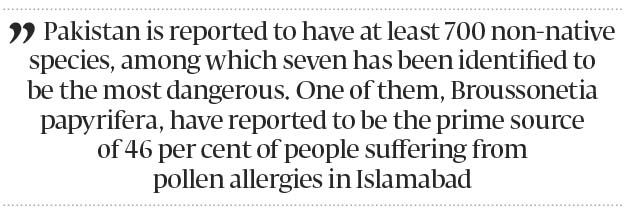
This behaviour makes us choose one good over another based on an unfair and irrational criteria, ie, beauty over utility, which is reflective not just on an individual level but also at the policy level. And more often than not, it is the ecology that is bearing the brunt of this mindset. The invasion of non-native plant species in Pakistan, whose plantation is endorsed and facilitated by the federal government pretty much explains this notion.
There will hardly be a person on this planet, who will argue against the importance of plants in maintaining the indigenous ecology or the immense pleasure they give to the eyes. But the story isn’t that simple, even plants have a vile side to them, which stems not from some sort of inherent evil but from their ill-conceived plantation in an ill-suited environment. Biological Diversity Convention terms these plants invasive alien species (IAS), which when planted outside their natural habitat, threaten biological diversity by altering and essentially destroying the habitat of the native species. Although such species look more aesthetic and are easier to propagate, but their threat to ecology as reported by different research studies is very real.
Pakistan is reported to have at least 700 non-native species, among which seven has been identified to be the most dangerous. One of them, Broussonetia papyrifera, have reported to be the prime source of 46 per cent of people suffering from pollen allergies in Islamabad. Such species are threatening not only the local flora but also local fauna because, according to estimates, IAS are responsible for almost 40 per cent of all animal extinction since the 17th century. Some non-native species do promote diversity by providing habitat to the native plants, but firstly the cataloguing and the information about the individual impact of non-native species is missing in the Biodiversity Action Plan, and secondly the ones lining the metro cities of Pakistan are mostly nothing but eye candies. As if ruthlessly deforesting and damaging the lungs of metro cities in the name of infrastructure development aren’t enough of a crime that this spread of ornamental shrubbery is substituted for the recklessly uprooted native trees. Amid the global climate change, heavily deforested Lahore is gasping for fresh air, and such activities resulting from lack of awareness and the fact that we are too hung up on aesthetics aren’t helping.

While exploring the policy level, even in the budget allocation, the effort to please our ‘beauty over utility’ mindset is evident in the hefty share of Public Sector Development Programme (PSDP) being allocated to infrastructure development projects. Surely, swanky flyovers and underpasses at the cost of green belts are much more aesthetically pleasing and evident than, for instance, health and education sector improvement. But not much can really be said to the government because it is playing right according to the mindset of its mandate, and in countries like Pakistan, where politicians have short time horizons, these ‘above the surface’ projects carry much more political worth.
Last year, the Prime Minister of Pakistan stated that ‘Karachi’s Green Line’ (KGL) will be more beautiful than Lahore’s Metro Bus’, while totally shunning all the other concerns that has plagued Lahore Metro project including the fact that it only caters to a mere 3.3% population of Lahore. The major utility that was expected out of this 30 billion rupees project was the decreased sprawl of private vehicles and the resultant reduction in emissions, but the reported congestion has remained pretty much the same barring on Ferozepur Road.
Although, in the larger context massive investment did essentially go down the drain, and that too in the face of alarmingly pressing problems such as poverty, illiteracy, and environmental degradation, but at least it made the government learn from its mistakes. The PM now looks to go one step further from his brother’s brainchild, but in an aspect that best appeals to our eyes and the least to our reason, and alas we are too hung up on the former, because for us that is the improvement that matters.
Since every cloud has a silver lining to it i.e. in this case is the enlarging spectrum of media and a vociferous opposition party and their resultant mobilising effect which can really help in achieving a mindset redo of masses. It is crucial that it happens, because only the change in the mindset of masses and the resultant pressure coming from their mandate can really make the incumbent government rethink its strategy. Otherwise, we will further diverge from the sustainable development path that is already mired with issues, and therefore will witness much worse instances of beauty becoming the beast.
Published in The Express Tribune, April 12th, 2017.
Like Opinion & Editorial on Facebook, follow @ETOpEd on Twitter to receive all updates on all our daily pieces.













COMMENTS
Comments are moderated and generally will be posted if they are on-topic and not abusive.
For more information, please see our Comments FAQ